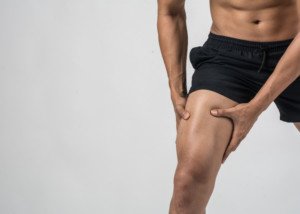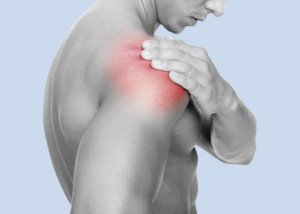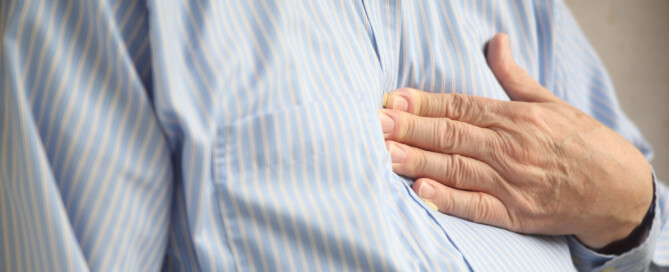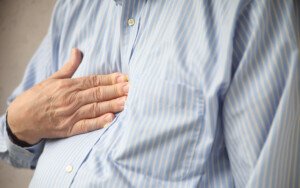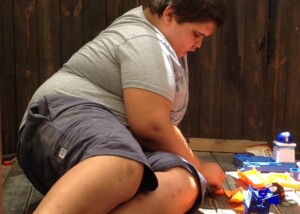Safer Alternatives to the Behind Neck Military Press

Has the behind neck military press been hurting your shoulders? Here are much safer alternatives that will get you the muscle growth, shape and strength you want.
Can Swallowing a Pill Screen for Barrett’s Esophagus?
Can swallowing a pill with a camera to screen for Barrett’s esophagus replace the standard upper endoscopy?
Top 5 Weight Loss Exercises for Stubborn Postmenopausal Fat

These five exercises are very effective at busting up stubborn postmenopausal fat.
You do not have to keep this fat. It’s yours to LOSE. Even if you’ve failed before.
Having excess fat is no breeze. It can lead to acid reflux, knee pain (especially when exercising), higher cholesterol or blood pressure, and many other ailments.
You do NOT have to accept weight gain as a normal part of menopause or the years after.
One of the biggest mistakes that postmenopausal women make is assuming that duration and continuous movement are the magic elixirs for weight loss.
Good news: Movement does not have to be continuous for 45 minutes. You CAN take rests.
And you don’t have to spend two hours in the gym every day to get rid of even the most stubborn fat.
If you’re practicing portion control with a plant based diet and limiting your consumption of high calorie foods such as pizza, giant burritos, pancakes soaked in syrup, ice cream, cookies, donuts, etc., you should be able to get rid of the rolls in your middle, the chunk in your thighs, and even the fat in your back.
Do the following five exercises to burn excess fat after menopause.
Squat

Shutterstock/sarocha wangdee
If you can lower only to where your thighs are parallel to the floor, rather than below that point, that’s still good form.
Deadlift

Shutterstock/SerdyukPhotography
Bench Press

Shutterstock/Monkey Business Images
Leg Press
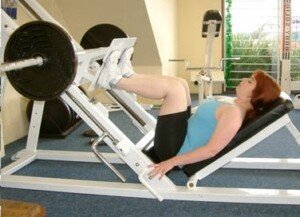
George Stepanek, CreativeCommons
Lat Pull-Down

Shutterstovk/sklyareek
The Fat Burning Formula
#1 Eight to 12 repetitions with a weight load that makes a 13th repetition impossible or very difficult.
#2 Sixty to 75 seconds in between each set
#3 Four sets each, with three to four minutes in between each set
#4 Do twice a week
Feel free to add your favorite ancillary exercises such as the seated row, the bent-over dumbbell row and hamstring curl.
Give up the side bends, seated twists, crunch machines and sit-ups.
The squat, deadlift and lat pull-down will work your core when done correctly.
The more muscles you work, the more fat that’s burned for energy. These five exercises work a lot of muscles at once; economy of exercise.
Mistakes that Will Sabotage Your Weight Loss Goal
#1 Failing to adhere to the above formula. When I say that a 13th rep should be impossible or very difficult, I MEAN IT. I also mean 60-75 seconds of rest in between each set of a particular exercise.
Avoid talking or using your phone, as this will lengthen your rest time.
#2 Failing to first learn proper form for the squat, deadlift and lat pull-down, which are among the most commonly done exercises with BAD form.
Proper Lat Pull-Down Technique
One final note: Keep doing your cardio, but consider a more effective form called high intensity interval training (HIIT).
 Lorra Garrick is a former personal trainer certified through the American Council on Exercise. At Bally Total Fitness she trained women and men of all ages for fat loss, muscle building, fitness and improved health.
Lorra Garrick is a former personal trainer certified through the American Council on Exercise. At Bally Total Fitness she trained women and men of all ages for fat loss, muscle building, fitness and improved health.
.
Top image: Shutterstock/Nadino
Why the Smallest Child in the Class CAN Be the Bully
If you think your small child can’t possibly be a bully because his or her accuser is bigger, then think again.
If adults can be scared of spiders, then it’s certainly believable that the smallest kid in the entire class could also be the biggest bully in that class – or even grade.
Size doesn’t always matter. Just ask the 250 pound lioness that takes down a 500 pound zebra.
Okay, maybe that’s not the fairest comparison, being that a lioness is equipped with a bite and claws that the zebra doesn’t have.
However, that short scrawny bully is also equipped in a way that the bigger victim is not.
If your child has been accused of being a bully, you’ll be mistaken to respond, “That’s impossible! Look how little he is!”
Now maybe he (or she) indeed is NOT a bully.
But you shouldn’t assume this just because he or she is smaller than the alleged victim.
It’s not the size of the bully that matters. It’s the bully in the size.

“While it might be easier for a physically larger child to intimidate a smaller child because of the threat of physical harm, it’s not impossible for a smaller child to bully a larger one,” says Dr. Tia Kern-Butler, a licensed psychologist for over 20 years who treats a broad range of issues including relationship problems and behavioral issues of children and adolescents.
“First, this myth assumes that bullying only comes from the threat of physical harm,” continues Dr. Kern-Butler. “However, bullying is, at its heart, a psychological construct.”
This is why there exist marriages in which an Alpha woman is abusive towards her Beta husband, even though it’s easier for him to rearrange the heavy furniture (she orders it against his will).
The same construct occurs among children, though a large child isn’t necessarily physically stronger than a smaller child.
“In order to bully someone, you must be able to convince them that you’re capable of harming them, and harm can come in many forms,” explains Dr. Kern-Butler.
“Social embarrassment for a child is an enormous fear that can be exploited by a bully of any size.
“It does not take a physically larger child to threaten to expose another child’s secret to peers.
“Secondly, this myth assumes that physically larger children are both confident/secure and not afraid of physical confrontation.
“A larger child who is shy, insecure or fearful of physical harm can certainly be bullied by a smaller child who is not afraid of physical conflict or getting into trouble.”
Also keep in mind that the larger child might actually believe that their little tormentor is capable of laying in a good fist.
Flashback: Junior High Art Class
- There were four to a table. My table included a husky tall girl, Louise.
- Paula was known grade-wide as the meanest bully. She was shorter than most of the girls and of trim build.
- Petite Paula sauntered over to Louise, leaned over her and began taunting her.
- Louise, in a mousy voice, said “Shut up!”
- Paula responded with an angry voice, “WHAT did you say?!”
- Still mousy, Louise replied, “I said shut up.”
- Paula grabbed Louise’s hair and scolded her, making the much bigger girl cower.
“Bullying is about power; the one who is not afraid has the power,” says Dr. Kern-Butler.
“Physical stature does not ensure fearlessness.
“Fear is a psychological experience.
“An elephant can be afraid of a mouse. A human can be afraid of a spider.”
It’s Nonsense to Think that Bullies Can’t Be Smaller than Their Victims

Media stereotype The victim is often a lot smaller than the bully.
If you’ve mined enough online forums about bullying, you will have found a lot of threads in which adults speak of being bullied during their school years…ABOUT their plus-size frame or being very tall.
The biggest kid in the class is often the target of bullies, taunted about their size. This construct is much more common among girls.
Were you a bystander of bullying during your school years?
Was the bully always bigger or taller than the victim?
I had witnessed a number of occasions in which the bully was a lot shorter than the victim.
This construct is rampant in adult life. A short puny man can have an entire neighborhood afraid of him. And not because he packs a revolver. It’s the way he behaves.
- Some small kids become bullies as a defense from being bullied.
- And just because a child is “bigger than everyone else,” doesn’t mean he or she has a mean streak.
Where does the bullying come from then?
The mean streak is cultivated at home. If the child witnesses bullying among older family members on a routine basis, they become his or her role models – and “role model” doesn’t always mean exemplary behavior.
The child in such a home either learns to become a victim OR learns how to become a bully.
Being mean and forceful is the only way they know how to navigate through school life.
He or she will not be making height and weight estimates when the urge to bully strikes. ANY size classmate can look vulnerable.
 Currently in private practice Dr. Kern-Butler spent 10 years as the lead child and adolescent psychologist with Winter Haven Hospital and served as the mental health liaison for the Children’s Advocacy Center for 14 years.
Currently in private practice Dr. Kern-Butler spent 10 years as the lead child and adolescent psychologist with Winter Haven Hospital and served as the mental health liaison for the Children’s Advocacy Center for 14 years.
Professionalpsychologyofpinellas.com/about-me
 Lorra Garrick has been covering medical, fitness and cybersecurity topics for many years, having written thousands of articles for print magazines and websites, including as a ghostwriter. She’s also a former ACE-certified personal trainer.
Lorra Garrick has been covering medical, fitness and cybersecurity topics for many years, having written thousands of articles for print magazines and websites, including as a ghostwriter. She’s also a former ACE-certified personal trainer.
.
Top image: Shutterstock/igor kisselev
Why Teaching Stranger Danger Won’t Cause Fear of People

If you think teaching your young child stranger danger might make them fearful of people, this article explains why you’re mistaken.
Can Strength Training Help Prevent Teen Eating Disorders?

How well can strength training prevent a teen girl from developing an eating disorder such as anorexia nervosa?
How Moms with Eating Disorders Can Protect Daughters from the Illness
There are specific ways that women with anorexia nervosa can help protect their daughters from developing this eating disorder.
Did Your New Boyfriend’s Dad Beat His Mom? Beware

If your new boyfriend’s father beat or abused his mother, you’ll want to reconsider getting involved with him. He may repeat this pattern with YOU. (more…)
Why Do Women Accept Rides from Men They Don’t Know?



